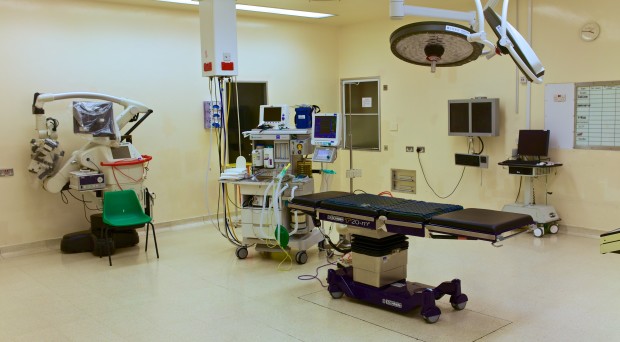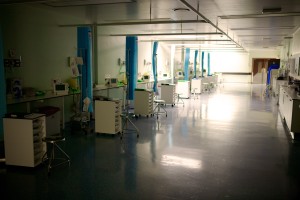
I work for the National Health Service; the hospital I currently work in has beds to care for over 1,300 patients, and employs over 8000 people. Along with this, the Emergency Department (ED/A&E) treats between 350 and 450 people per day; so it is a busy building.
I normally get in to work for 07:30, but as a training doctor I move between jobs every 6 to 12 months, and so the journey may be 15 minute run or a 90 minute drive. Most days start with a morning meeting, where the on-call surgical team from the previous evening present the emergency patients who have been admitted in the last 24 hours.
You never know what you’re going to see in a day on call, but most days become a busy rhythm of visiting the A&E or the wards between operations
If I’m the ‘on call’ registrar for the day then there are usually patients who are waiting for operations, and it will be my responsibility to perform these procedures, with or without my consultant’s supervision depending on the complexity of the case.
You never know what you’re going to see in a day on call, but most days become a busy rhythm of visiting the A&E or the wards between operations to see to 20 or more patients referred to our team.
Common complaints include abscesses that require drainage, patients with appendicitis who require their appendixes removing (nearly always done ‘keyhole’), gallbladder infections, pancreatitis, and patients who have bowel obstruction, bleeding or perforations. I will be the first specialist to see patients who are referred by the Emergency Department, and I will make decisions regarding the initial investigations and treatment of these people.
I also have to attend ‘trauma calls’. Whenever my pager alerts me that a patient who has suffered major trauma (i.e. a high impact crash, high fall or projectile injury) has arrived, I am expected as quickly as possible in A&E to form part of the team who initially assesses and treats the patient. The most extreme scenario would be a patient with internal injuries who would certainly die without opening their chest or their abdomen in the emergency department. Fortunately I haven’t had to face this scenario yet.

If I’m not scheduled to be on call, then the morning meeting is followed by a ward round of the inpatients under my team’s care. This is normally around 25 patients and will be a combination of people who have been admitted as emergencies, or operated on ‘electively‘ by our team. Common cases include removal of large bowel cancers, removal of inflamed bowel in patients suffering from inflammatory bowel diseases, hernia repairs, and various anorectal procedures.
Clinic starts at 09:00, and the mix of patients you see is dependent on the sub-speciality of the consultant you’re in clinic with. As part of the National Institute for Clinical Excellence (NICE) guidelines on cancer diagnosis, many patients with suspicious symptoms will have been referred by GPs under a ‘two week wait’ scheme, which means that clinics are often busy. Many of these patients will require further investigation with endoscopy of the bowel. Other referrals range from hernias to haemorrhoids, and abdominal pains to changes in bowel habit.
The aim is to safely navigate around a person’s anatomy, protecting what structures need to be conserved, and safely removing whatever lump needs to be removed.
The afternoon may involve an operating list or endoscopy list. Endoscopy for the colorectal surgeon means performing colonoscopies, a camera test of the bowel. It’s a separate skill in itself and one that takes years to master.
If it’s an operating list, then I’ll make sure that patients are prepared for surgery, which includes checking investigations are up to date, making sure that equipment is available and the theatre staff are briefed. I’ll also take the consent of the patients and answer any questions they may have before their operations.
Operating is my favorite part of the job, as it is for many surgeons. The aim is to safely navigate around a person’s anatomy, protecting what structures need to be conserved, and safely removing whatever lump needs to be removed. It’s meditative to be completely focused on one task at a time, and although there are times when operations are more difficult than expected or don’t go to plan, I’m rarely stressed in theatre. There will inevitably be times when you don’t know what your next move should be, but with experience you learn to think on your feet.
Not all of this happens every day, and I am expected to attend regular teaching sessions and yearly conferences to stay up to date with current practice.
The next two years will involve full time research before returning to training for five or six years, so I have a long way to go before being signed off as an independent practitioner, or consultant, around the age of 36.
Look out for our Q&A with Guy on life as a surgeon later this week.
Comments